|
|
|
Sort Order |
|
|
|
Items / Page
|
|
|
|
|
|
|
| Srl | Item |
| 1 |
ID:
092362
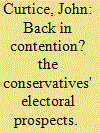

|
|
|
|
|
| Publication |
2009.
|
| Summary/Abstract |
This article assesses whether the Conservatives are likely to be serious contenders for power at the next British general election. First it assesses how well the party will have to do to 'win' the election. Second, it considers whether the record of the polls since 2005 suggests the party is capable of securing the necessary support. Third, the article assesses whether the ideological mood of the electorate has moved closer to the Conservatives since 2005. Finally it considers whether the image of the party has improved.
The Conservatives are likely to have to outpoll Labour by a considerable margin to become the largest party but their record in opinion polls suggests they could achieve this. The ideological mood of the electorate has moved closer to the party, while David Cameron is a relatively popular leader. But the party has still not fully restored its reputation for economic competence.
|
|
|
|
|
|
|
|
|
|
|
|
|
|
|
|
| 2 |
ID:
117483
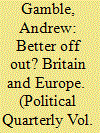

|
|
|
|
|
| Publication |
2012.
|
| Summary/Abstract |
The largest ever rebellion of Conservative MPs on Europe took place in October 2011 with 81 Conservative MPs defying the Conservative whip to vote for a referendum on Britain's continued membership of the European Union. This resurgence of dissent over Europe has been fuelled by the crisis in the eurozone. The Conservative party is now an overwhelmingly Eurosceptic party, but Conservative Eurosceptics are divided over whether the Government should use the opportunity of the eurozone crisis to take Britain out of the European Union, or whether it should seek to negotiate a looser arrangement, or do nothing at all. Conservative policy on Europe has been further complicated by the coalition with the Liberal Democrats, and by the consequences for the British economy if the eurozone disintegrates. Public opinion is also divided. British policy on the European Union remains ambivalent and muddled because British aims are inconsistent, and because there is no consensus on where Britain's interests truly lie.
|
|
|
|
|
|
|
|
|
|
|
|
|
|
|
|
| 3 |
ID:
148336
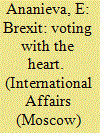

|
|
|
|
|
| Summary/Abstract |
A "POLITICAL TSUNAMI," an "existential crisis" and "the not so United Kingdom" are several of the many assessments the British media used to comment on the results of the June 23, 2016 EU referendum. The nation was invited to give a simple and unequivocal answer to a far from simple and far from unequivocal question very much like the one addressed to Greek philosopher Menedemus in the 3rd century B.C. whether "he had left off beating his father."
|
|
|
|
|
|
|
|
|
|
|
|
|
|
|
|
| 4 |
ID:
092369
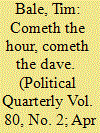

|
|
|
|
|
| Publication |
2009.
|
| Summary/Abstract |
While one can overstate the extent to which the Conservative party has changed since 2005, especially in the light of its response to the recession, the upturn in its electoral prospects is undeniable. Not surprisingly, the Conservative leader, David Cameron, is widely credited with turning around his party's fortunes. In fact, he started with several advantages over his predecessors: New Labour was well past its prime; the economy was running into trouble; and an increasingly desperate Conservative party was more willing to listen to the message that it needed to modernise and moderate. That said, Cameron has been crucial. His communication skills are unparalleled. Early success bought him time and 'permission to be heard'. Most important though, has been his determination-despite media criticism-to stick with a staged strategy focused on conveying change and a move to the centre ground while at the same time reassuring and dividing the Tory right.
|
|
|
|
|
|
|
|
|
|
|
|
|
|
|
|
| 5 |
ID:
099782
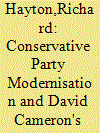

|
|
|
|
|
| Summary/Abstract |
A key feature of David Cameron's electoral appeal is his carefully cultivated image as a 'family man'. Cameron has repeatedly stressed the importance of the family to his political views and stated his desire to see marriage rewarded through the tax system. At the same time, Cameron has presented himself as a modernising leader, keen to demonstrate that he and his party are in touch with contemporary society. Central to this effort to detoxify the Conservative brand has been an emphasis on social liberalism. The potential conflict between these two objectives reflects the division in the party between social liberals and traditionalists, which has become increasingly apparent over the past decade. This article examines Conservative party policy and rhetoric on social and moral issues since 1997, particularly gay rights and family policy. It notes that a significant divide remains in the Conservative party between social liberals and traditionalists, so in this respect Cameron's modernisation project remains far from complete
|
|
|
|
|
|
|
|
|
|
|
|
|
|
|
|
| 6 |
ID:
092364
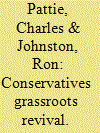

|
|
|
|
|
| Publication |
2009.
|
| Summary/Abstract |
Healthy party grassroots constituency organisations play an important part in modern electoral campaigning, especially in marginal seats, and political parties try to concentrate their efforts on those closely contested constituencies. Recent evidence on party fund-raising at a local level shows that the Conservatives have taken considerable strides in supporting their campaign organisations in marginals, and have done so in a way which enhances their long-term campaigning potential there. The party's grassroots organisations are increasingly well-resourced, especially in the seats the Conservatives need to win back if they are to win the next General Election. However, while fund-raising suggests a healthy grassroots where it is needed, party membership data highlights continued problems for the party.
|
|
|
|
|
|
|
|
|
|
|
|
|
|
|
|
| 7 |
ID:
092373
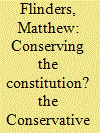

|
|
|
|
|
| Publication |
2009.
|
| Summary/Abstract |
In 2008 David Cameron declared that the Conservative party was 'ready for government' and suggested that 'the change we need is not just from Labour's old policies to our new policies… It's about a change from old politics to new politics'. This 'new politics' narrative is something of a cliché: British constitutional history reveals a regular pattern whereby opposition parties renege upon implementing far-reaching constitutional and democratic reforms once they win power. It is in this context that this article draws upon documentary analysis and a number of interviews to examine the Conservative party's position on constitutional reform and democratic renewal. It concludes that although the Conservative party has spent the last decade decrying the 'destruction' of the constitution it has undertaken little detailed preparatory work in relation to how it might seek to alter the governance of Britain. As a result the research presented in this article provides a number of insights into elite politics, strategic game-playing and executive veto capacities within a context of growing political disengagement from politics and falling levels of trust in politics.
|
|
|
|
|
|
|
|
|
|
|
|
|
|
|
|
| 8 |
ID:
107207


|
|
|
|
|
| Publication |
2011.
|
| Summary/Abstract |
This article considers possible future directions for education policy and public service governance under the Conservative-led coalition government. The article considers the extent to which Conservatives might develop a distinctive strategy for managing public services that breaks decisively with that of the New Labour era. The coalition faces a markedly different political and economic context for public service reform compared to its predecessor. This article argues that these contextual constraints make a continuation of the New Labour governing strategy less viable, but unresolved tensions in the coalition education policies enacted to date may hinder the development of a novel project for education reform. As a consequence, the New Labour education project seems likely to remain largely intact for the foreseeable future.
|
|
|
|
|
|
|
|
|
|
|
|
|
|
|
|
| 9 |
ID:
161678
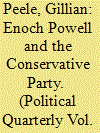

|
|
|
|
|
| Summary/Abstract |
This article examines Enoch Powell's ‘Rivers of Blood’ speech in relation to the Conservative party. Powell's speech created an additional challenge to a Conservative party already weakened by the loss of the 1964 and 1966 elections and by the failure of the newly elected leader, Edward Heath, to impress his authority decisively on the party. Powell had some parliamentary support but his real following was concentrated in the Conservative grass roots. Powell lost the support of the liberal‐minded Shadow Cabinet; but after 1968 the Conservatives nevertheless moved to the right on the issue, especially after Mrs. Thatcher became leader in 1975. His speech has cast a long shadow as the party has sought to modernise in more recent times and to appeal to a more racially diverse electorate.
|
|
|
|
|
|
|
|
|
|
|
|
|
|
|
|
| 10 |
ID:
117354
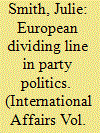

|
|
|
|
|
| Publication |
2012.
|
| Summary/Abstract |
Europe has long divided the UK's political parties, especially the Conservatives and Labour. The parliamentary vote to enter the Common Market relied on rebel pro-European Labour MPs, while in the 1980s Labour was calling for withdrawal. If a decade on the Conservative Party saw a growing number of rebels against the Treaty of Maastricht, three decades later those Tory rebels-alongside a new party established to oppose membership, the UK Independence Party-have grown in number and look to the UK's ultimate withdrawal from the EU. This article explores the impact of European integration on British party politics, examining the ways in which it has caused division and fragmentation at the national level. It then looks at the impact of British membership on European level parties, which have also seen a degree of fragmentation owing to the nature of British parties.
|
|
|
|
|
|
|
|
|
|
|
|
|
|
|
|
| 11 |
ID:
146492
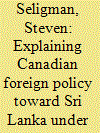

|
|
|
|
|
| Summary/Abstract |
Canada’s policy toward Sri Lanka underwent a significant shift following the end of the Sri Lankan Civil War in May 2009. Originally, the Harper government viewed Sri Lanka’s war with the Liberation Tigers of Tamil Eelam (LTTE) through the prism of the global war on terrorism. Canada listed the LTTE as a terrorist group and offered only mild and sporadic criticism of the Sri Lankan government’s human rights record. However, after winning a majority government in 2011, the Harper government has described itself as one of the world’s leading proponents of reform in Sri Lanka and has condemned the government of Sri Lanka in strong terms. This paper examines the Harper government’s foreign policy toward Sri Lanka and argues that electoral politics came to play an increasingly significant role.
|
|
|
|
|
|
|
|
|
|
|
|
|
|
|
|
| 12 |
ID:
092406
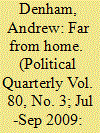

|
|
|
|
|
| Publication |
2009.
|
| Summary/Abstract |
The Conservative Party is the oldest of the 'mainstream' British parties, but has only elected its leader since 1965. In this article, I explain the variety of methods used by the Party to select its leader and assess the impact of 'democratisation' over time. I begin by examining the informal 'system', known as the 'magic circle', which existed until 1965, and explain how and why it came to be abandoned. I then discuss the six elections between 1965 and 1997, when the Tory leader was chosen exclusively by the Party's MPs. Finally, I assess the impact of the 'Hague rules', according to which Party members have the final say, between their adoption in 1998 and the election of David Cameron in 2005.
|
|
|
|
|
|
|
|
|
|
|
|
|
|
|
|
| 13 |
ID:
117496
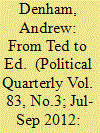

|
|
|
|
|
| Publication |
2012.
|
| Summary/Abstract |
Since 1965, British political parties have radically, and repeatedly, changed the ways in which they choose their leaders. In this article, I explain how and why these changes occurred and assess the consequences of the 'new' selection procedures adopted by four 'mainstream' parties: Labour, the Conservatives, the Liberal Party and the Liberal Democrats. In the first section, following Sjoblom and Stark, I outline a theoretical framework which purports to explain the criteria used by parties in parliamentary systems when choosing their leaders. I then examine the four parties in turn and consider two questions. First, how and why has the process of selecting British party leaders changed over time; and secondly, to what extent, and why, have the 'new' selection procedures adopted since 1965 produced different outcomes, resulting in the election of leaders who would not have been chosen had the decision rested with their party's elites and/or MPs alone?
|
|
|
|
|
|
|
|
|
|
|
|
|
|
|
|
| 14 |
ID:
084478
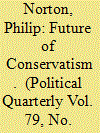

|
|
|
|
|
| Publication |
2008.
|
| Summary/Abstract |
British Conservatism embodies certain basic, though not always compatible, tenets of belief. They have underpinned the Conservative Party, which has been the most successful political party in the history of western Europe. The party was the 'in' party in British politics in the 20th Century; the reasons for that success shifted in the 21st century to it principal opponent party. Attempts by Conservative leaders in the first two parliaments of opposition constituted quick-fix and ultimately doomed approaches to restoring electoral dominance. The party under David Cameron has shifted to a long-term, grounded approach, learning the lessons of earlier periods of opposition. Though the process remains incomplete, the Conservative Party is placed for the first time in the 21st century to return to being a party of governance.
|
|
|
|
|
|
|
|
|
|
|
|
|
|
|
|
| 15 |
ID:
107206
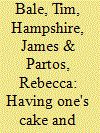

|
|
|
|
|
| Publication |
2011.
|
| Summary/Abstract |
The May 2010 general election represented a change in tone on immigration and asylum policy for the Conservative party. Although its manifesto still contained a promise to limit numbers and expressed concern about the abuse of student visas, the Party's previous fixation with asylum seekers had disappeared. This article considers the rationale for these developments in the light of David Cameron's election as leader in late 2005 and his efforts from then on to reposition his party. Cameron's initial silence on this issue and his appointment of a moderate as immigration spokesman were part of an attempt both to shift the focus onto the economic impact of migration and, more broadly, to 'decontaminate the Tory brand' in order to gain 'permission to be heard' by small-l liberals who were critical to the Party's electoral recovery but alienated by hard-line stances. That said, immigration was never entirely forgotten even in this early period and was always seen, so long as it was carefully handled, as an issue capable of benefitting the Tories. As such, it was skilfully factored back into the Party's offer from late 2007 onwards. In government, the Conservatives may have the upper hand on immigration over their junior coalition partner, but this is no guarantee that they will be able to deliver the outcomes they promised
|
|
|
|
|
|
|
|
|
|
|
|
|
|
|
|
| 16 |
ID:
105873
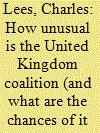

|
|
|
|
|
| Publication |
2011.
|
| Summary/Abstract |
This article draws upon insights from theoretical and empirical studies of coalition behaviour in multiparty politics to examine the formation of the United Kingdom coalition following the general election of 6 May 2010. It argues that the formation of the Conservative-Liberal Democrat coalition is not unusual in historical terms or in the context of contemporary European politics; and that although it is a break from the more recent pattern of postwar British politics it nevertheless does conform to expectations in the light of the coalition literature. The article also provides a comparative analysis of the impact of Britain's 'First-Past-The-Post' (FPTP) electoral system on party competition and an examination of the performance of the Alternative Vote (AV) system and argues that if the United Kingdom retains FPTP then a return to single-party government in 2015 is highly likely; and it is not inevitable that the introduction of AV would significantly advantage the Liberal Democrats.
|
|
|
|
|
|
|
|
|
|
|
|
|
|
|
|
| 17 |
ID:
105869
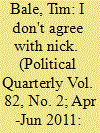

|
|
|
|
|
| Publication |
2011.
|
| Summary/Abstract |
Insider and journalistic accounts of the formation in May 2010 of the Conservative-Liberal Democrat coalition actually, although not explicitly, rely on types of explanation familiar to those who study politics. They tell us that structure (or at least the economy) was important. So too, they suggest, were institutions (timing and the rules of the game). They also stress the importance of contingency ('events, dear boy, events') and agency (who did and said what to whom). While none of these things were unimportant, they only served to make certain an outcome that anyone with a passing acquaintance with the theory and the practice of coalition formation would have predicted-namely a 'minimum winning coalition'. The only thing that could have made that outcome uncertain was a fundamental ideological difference between the two parties involved; however, it quickly became apparent-to the surprise of those of us who failed to appreciate how much the Liberal Democrats had changed-that no such difference existed. Indeed, it is possible to argue that the coalition formed was not merely minimum winning but 'minimum connected winning'. As such, its formation was not so much breathtakingly bold and exciting as pretty much inevitable. In the end, the maths and the physics mattered more than the chemistry. Fortunately for the Conservatives, the Liberal Democrats seriously underplayed their hand in the negotiations, with possibly disastrous consequences for them in the long term.
|
|
|
|
|
|
|
|
|
|
|
|
|
|
|
|
| 18 |
ID:
095294
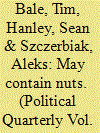

|
|
|
|
|
| Publication |
2010.
|
| Summary/Abstract |
The British Conservative Party's decision to leave the European Peoples' Party-European Democrats (EPP-ED) group in the European Parliament and establish a new formation-the European Conservatives and Reformists (ECR)-has attracted criticism, much of it focused on the supposedly extremist politics and character of the partners with which the Conservatives have chosen to work. In fact, while those parties which have joined the Conservatives in the new group are for the most part socially conservative, they are less extreme and more pragmatic than their media caricatures suggest. Moreover, such caricatures obscure some interesting incompatibilities within the new group as a whole and between some of its Central and East European members and the Conservatives, not least with regard to their foreign policy preoccupations and their by no means wholly hostile attitude to the European integration project.
|
|
|
|
|
|
|
|
|
|
|
|
|
|
|
|
| 19 |
ID:
092363
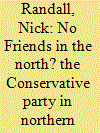

|
|
|
|
|
| Publication |
2009.
|
| Summary/Abstract |
Having won just 19 of 162 seats in northern England at the 2005 general election, the Conservative party under David Cameron's leadership has made an electoral revival in the north of England a particular priority. This article first outlines the Conservatives' post-war electoral record in the north and considers the significance of northern England to the party's strategy at the next general election. It then moves on to examine the potential for socio-economics, identity, memory, ideology and party organisation to frustrate its current ambitions for revival. Finally, it outlines and evaluates the initiatives which the party has undertaken in the north of England since 2005.
|
|
|
|
|
|
|
|
|
|
|
|
|
|
|
|
| 20 |
ID:
111657
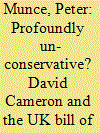

|
|
|
|
|
| Publication |
2012.
|
| Summary/Abstract |
This article considers David Cameron's proposal to repeal the Human Rights Act (HRA) and replace it with a British Bill of Rights. Cameron's proposal has been heavily criticised by a range of political, academic and non-state actors and was described by a current senior Coalition Cabinet member as 'xenophobic' and 'legal nonsense'. This article takes a slightly different direction to those lines of attack and critique that have been developed of the Conservative's proposals. The central proposition of the article is that Cameron's proposal is profoundly un-Conservative at two levels. Firstly, at the level of Conservative approaches to constitutional reform and secondly, at the level of Conservative political philosophy.
|
|
|
|
|
|
|
|
|
|
|
|
|
|
|
|
|
|
|
|
|